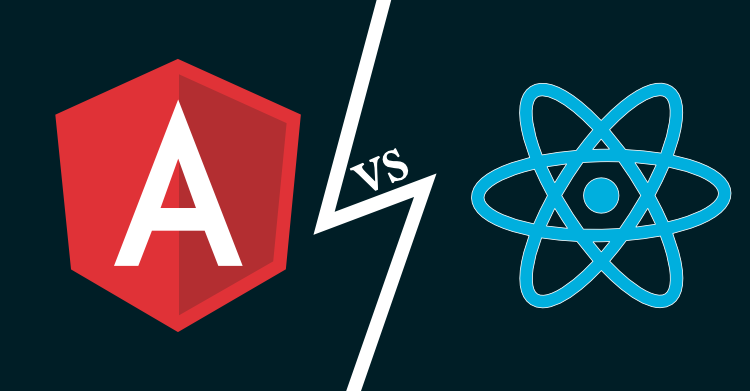
React vs. Angular: Why Learning Both is Important

The programming landscape changes all the time and coders need to keep up in order to get good jobs. In the case of JavaScript, one of the most prominent topics of discussion is angular vs react. These are frameworks that employers will be very keen to bring up and according to our findings, it can be instrumental in landing that cushy position you have always wanted.
So, what exactly is the deal with angularjs vs reactjs? As already noted, they are both frameworks based on the JavaScript programming language. Along with Vue, they are the most popular JS platforms and companies aim to capitalize on that. This is why we always encourage programmers to at least, become familiar with them if they can’t outright master them.
What’s the Deal With React VS Angular?
Based on our findings, the whole excitement surrounding react and angular, or more specifically, react VS angular has to do with the fact that they are very similar in nature and functionality.
This makes choosing between them a major source of headache for programmers, mostly because it can be quite difficult to switch later on if one does not confer to their original thought on the project.
Simply put, if they choose react and discover that it is not the best one for their needs way, later on, it is going to absolutely suck to backtrack. As you might expect, though, a lot of this comes down to knowing what these platforms are supposed to offer so that you can make your choice safely.
Knowing which of them is better for your needs and that of your project, as well as your level of skill, you won’t have to worry about running into obstacles later. This lack of familiarity is why the topic of the difference between angular and react is so prominent.
What is ReactJS?

What is React? React or ReactJS is a JavaScript library that is open for pretty much anyone to use. It is one of the most common tools for building websites that are in need of interactive aspects, which is pretty much all websites, these days. Among the examples of the elements that can be added to a site using this platform are:
- Animated graphics
- Photo slideshows
- Interactive forms)
- Interactive games
Those are just a few of what can be gained using this framework. It is also worth noting that having effective User Interfaces or UIs is one of the biggest reasons why companies are absolutely salivating to find coders able to work with React.
This is based on the surveys we have seen. Without it, it would be very difficult for them to remain competitive.
React is simply one of the easiest of these frameworks to use in this regard, containing convenient options for scripts that don’t need to be written multiple times thanks to the library provided. This alone makes this framework highly sought after, especially for programming teams with not a lot of incredible talent.
When utilized properly, React is far superior to other JS libraries simply by virtue of the effectiveness of the UI features that it can produce. From toolbars to menus, to link buttons and the like, there is so much more finesse that goes into the creation of those things with the help of React
What is Angular?

What is Angular? Angular is similar to ReactJS in that it is also a framework that works off of the JavaScript language. This one was created by Google and has been in use for several years now. It should also be noted that, while Angular is often referred to as AngularJS, they are not the same things. AngularJS is the predecessor and comes with quite a few distinctions.
You can learn a lot more about angular VS angularjs with many of the resources available to you online. In any case, Angular is similar to React because it basically allows the code to build UIs on the front end. However, there are quite a few more limitations compared to its main alternative. Whereas React is a JS library, Angular is purely framework.
It is also worth pointing out that Angular is just one of countless JS frameworks that are available out there for use. We have come across plenty of these in the market, but a vast majority of them are too specialized for broad applications.
Angular also receives a ton of modifications from programmers every single day thanks to it being so easily accessible. This means that anyone can submit their own tweaks based on their experience with the framework. This also means that it can only get better every day.
How to Master React and Angular
It is highly recommended that you learn both React and Angular even if you have no intention to make use of them as often as you should in the near future. Due to the overwhelming popularity of this library and framework duo, it is a lot easier to see what roles they will play in the future.
In any case, mastering both React and Angular is advised and the way to do it is to simply understand how they both differ so that you can create a solid foundation in both of them. You can start with the fact that React is generally faster than Angular, though, only by a small amount. This is often considered one of the biggest advantages of react over angular.
This has to do with how a browser’s Document Object Model (DOM) typically reads and then acts on the documents that are presented by the library and framework.
Just to give you some context, Angular uses traditional DOM while React uses Virtual DOM. The latter basically specializes as soon as the UI buttons are built, which basically means that the speed of reading and then responding is increased.
To that end, it would be worthwhile to think of React as a specialized library to use, thus allowing for considerable headway in terms of efficiency. On the other hand, Angular his multipurpose, which makes it good for projects that require a bit more flexibility in terms of function.
The differences will not be as appreciable in a test setting as it will be in a real-world setting. To users, every little microsecond counts, which is worth noting when choosing to go with angular or react.
With that being the case, you can already see the merits of having some grasp of how these two options work and why mastering both of them would be to your advantage. Now, we can move on to the actual process of doing so.
First, you will need to understand the concepts behind each one. From our experience and that of other programmers, React is more about efficiency while Angular is about utility.
If you are planning on actually mastering these two, you will need to make sure that you get your foundations right. This means that you will need to start with Angular first. The reason for this is very simple: It’s more difficult to learn and takes a bit longer to get a good grasp of.
Simply put, if you want to learn Angular, your JS expertise will need to be correspondingly high. This means that the requirement for mastering Angular means that you should already be good with JS, in the first place. This will then allow you to get a good handle on performance issues, state management bugs, and so much more.
If you do go down this route, it would also be best for you to know about TypeScript, which is a programming language that is adjacent to JS. This will certainly add more to your load, but if you want to master Angular, this is something that you will have to do. Once it’s done, the rest will practically take care of itself.
Once you are done mastering Angular, dealing with React will practically be a breeze. As the one with the easier learning curve of the two options, choosing React first before diving deep into Angular would have been quite the challenge for any programmer regardless of their talent. Take note that we are talking about mastery here, not just coming to grips with the JS tools.
Not only will saving React for last help you appreciate the sheer difference in functionality between the two, but it will also help you decide which one to choose. After all, if you are already intimately familiar with exactly what they can do, it will just be a matter of deciding what you need to do with them. This also contributes to react vs angular popularity.
The biggest reasons why you would even want to put so much time and effort into mastering both React and Angular, however, is the fact that it will become much easier to deal with other frameworks and libraries in the future. When you already know one, it becomes more likely that you will know what to do with the others.
There is no guarantee that React and Angular will be as popular or as necessary for companies in the future as they are now. Even these two options are constantly undergoing changes thanks to the input from members of the coding community.
In the future, there may be better frameworks and libraries to replace them, but they will be based on them in one form or another. We have seen this firsthand.
Which to JS Platform to Choose

If you have to choose between React and Angular after you have mastered them, though, under what conditions will picking one over the other make the most sense? You can start by considering which of them will most suit your project based on what you want to achieve. From there, you can take the following into consideration:
- Time limit
Every project has a limit on how soon it would need to be finished or how long the client would be willing to wait. For projects that require fast progress that involves the least amount of complications, there is no other choice than React. It’s just the most logical option.
Not only does it come with the least amount of baggage that can significantly slow down progress, but it also has fewer obstacles for even less talented programmers to cope with. This means that you won’t have to bring in personnel that are not as competent.
- Complexity of UI
While one of the biggest reasons for using React is its speed, ease of use, and simplicity, one of its drawbacks is that it is quite specialized. This means that for anything too complicated, the better choice might end up being Angular. This goes for responsiveness, the scripts involved, and even the purpose of the pages.
- Nature of website
Depending on the kind of site that needs to be built and what functionality will be involved, it can be done the fast way or the slow way. If all that is really needed are simple commands or menu buttons, there’s no reason to bother with Angular. For more complex sites that involve mapping, data analytics, and more, it might be a good idea to take your time.
- Target demographic
Finally, if the target demographic for the site being built or whatever the project involves is one that needs a lot of interactions and expects them, it would be worth investing the time with Angular. However, if the demographic are more interested in technical details rather than flair, React can do the job just fine.
Why React VS Angular Matters?
When it comes to comparing react VS angular, the topic is often discussed simply because the choice will determine much of how a project will go. The wrong choice by the wrong programmer can easily result in weeks or months of wasted effort, which translates to wasted money.
Companies do not appreciate wasting money unless it brings them even more money. So if the discussion is about which of those two popular options is best in making the company money, employees will have to pay attention.
Recommended articles


